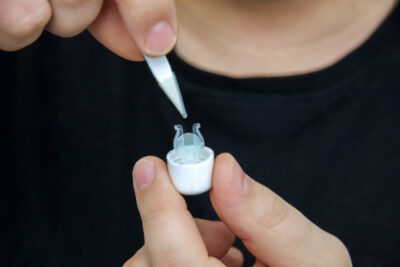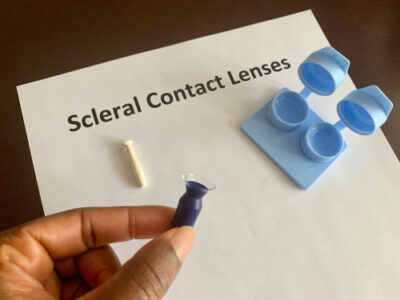If you have a refractive error and rely on glasses to see, you may have considered getting contact lenses. There are many different contact lenses, although soft contact lenses are recommended to most people with healthy eyes.
But there are different types of contact lenses for individuals who may need more vision correction than soft contact lenses can provide. There are also other kinds of soft contact lenses to choose from.
When deciding to get contact lenses, your eye doctor will recommend the best contact lens for you and fit them to your eyes. But it can be helpful to know your options before seeing your eye doctor. Keep reading to learn more about the contact lenses available and which may be best for your eyes!
Soft Contact Lenses

Soft contact lenses are the most commonly used contact lenses. They’re soft and flexible and allow more oxygen to reach the eye than hard contact lenses.
Most people choose them because they’re comfortable and easy to wear. However, they may only partially correct your vision, especially if you have astigmatism.
They’re disposable but come in different wear lengths, from dailies to monthlies.
Rigid Gas Permeable Contact Lenses

Rigid Gas Permeable (RGP) contact lenses are harder and more durable than soft contact lenses. They can be less comfortable, but for some people, they take a little longer to get used to.
This is because they’re less flexible and don’t allow as much oxygen to enter the eye. But rigid gas permeable contact lenses offer patients clearer vision and can correct a more comprehensive range of prescriptions, including astigmatism.
They also can last years, so they may be less expensive than soft contact lenses, which require replacing at least every month.
Hybrid Contact Lenses
Hybrid contact lenses offer the clear vision of rigid gas permeable lenses and the comfort of soft lenses. The middle is hard, like a rigid gas permeable contact lens, but the lens’s outer part, called the skirt, is soft.
Hybrid lenses don’t last as long as rigid gas permeable contact lenses, but you may be able to use them for up to six months. The main drawback of hybrid lenses is that they can be costly.
Scleral Contact Lenses

You may require a specialized contact lens if you have irregularly shaped corneas due to corneal disease or otherwise hard-to-fit eyes. The best kind of contact lens for irregular corneas is a scleral lens.
Scleral contact lenses are rigid gas permeable contact lenses that cover a larger area of the eye. Most contact lenses mainly cover the pupil and iris.
Scleral contacts cover much of the sclera. The sclera is the white part of your eye.
These specialized contact lenses can be more comfortable than standard rigid gas permeable contact lenses as the large lens creates a fluid reservoir to keep the eye well-moisturized. They are also customized to your eyes, ensuring a precise fit.
For patients that need this kind of customizability, rigid gas permeable contact lenses also reduce the chance of the lens moving during blinking or other movement from the eye. Being more custom helps these contact lenses feel more comfortable and stable for long-term use and wear.
Different Lengths of Wear
Rigid gas permeable contact lenses, hybrid contact lenses, and scleral lenses can last anywhere from six months to several years, so you don’t have to replace them as often as you would soft contact lenses. But most patients use soft contact lenses.
Soft contact lenses are disposable but come in different wear lengths.
Disposable Contact Lenses

You can only use traditional disposable contact lenses during the day. You put them in when you wake up and take them out before going to bed to sleep.
But you can use the same pair for several days, depending on what kind of contact lens you get. Some are meant to be reused for a week, some for two weeks, and some for up to a month. Daily contact lenses, however, are disposed of after only one use.
There are advantages to dailies and advantages to weeklies and monthlies. Dailies can be more convenient and comfortable because you don’t have to worry about cleaning them.
Once you’re done with them, you dispose of them and use a new pair the next time you’re ready. But all the plastic packaging they come with can be wasteful.
Longer-use contact lenses tend to be less expensive, and while you do need to clean them regularly, they can still be comfortable as long as you take good care of them.
Extended Wear Lenses

Extended-wear contact lenses refer to lenses you don’t need to change. You can wear them through the night.
But despite the name, these soft contact lenses are still disposable. Some are meant to be worn 1-6 days in a row, while others you can wear up to 30 days.
Some people are less tolerant of overnight wear, so extended-wear lenses are only recommended for some patients.
But to determine what lens works best for you, you must first be evaluated for contact lenses. Learn more by requesting an appointment with one of our eye doctors at Sugiki Portis Eye Center.
We can recommend the best option for you and get you fitted for your new contact lenses!
What if Contact Lenses Aren’t for You?

If you try contact lenses and cannot find any that feel like they suit you, don’t worry! There are still alternatives to glasses!
One of the best alternatives is LASIK. Getting LASIK means you can put all visual aids, including glasses and contact lenses, in the past.
To learn more about LASIK, you can schedule your commitment-free consultation today at Sugiki Portis Eye Center. Learn more about LASIK and contact lenses by requesting an appointment with us in Honolulu, HI, today!





